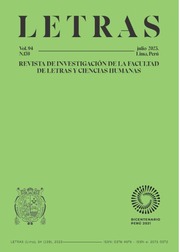Parochials of this World: the politics of culture of Arguedas and Cortazar in World Literature
Abstract
The world literature debate has spawned a set of discussions on the role of postcolonial literature, which prompts a redesigning of the current understanding and teaching of certain cultural fields. In this context, Latin American literature has a particularly problematic position, which this article explores through the analysis of the polemics and cultural politics of two emblematic writers: the Peruvian José María Arguedas and the Argentine Julio Cortázar. By examining the impasse held by both writers, as well as their formulations on the need to universalize/globalize Latin American literature, this paper explores how these authors anticipate some key terms in the discussion of world literature when applied to Latin American literature, such as universality and worldliness, through an ideological tension that will be examined from decolonial critique and world-system theory.Downloads
Métricas alternativas
References
Arguedas, J. M. (1968). No soy un aculturado. https://redaccion.lamula.pe/2013/01/18/jose-maria-arguedas-yo-no-soy-un-aculturado/albertoniquen/
Arguedas, J. M. (1988 [1971]). El zorro de arriba y el zorro de abajo. Horizonte.
Arguedas, J. M. (1989). Indios, mestizos y señores. Horizonte.
Casanova, P. (2004 [1999]). The World Republic of Letters. Traducido por M. B. DeBevoise. Cambridge, Harvard University Press.
Casanova, P. (2005). Literature as a World. New Left Review, 31, 71-90.
Castro, J. de. (2008). The spaces of Latin American literature: tradition, globalization, and cultural production. Palgrave Macmillan.
Chakrabarty, D. (2007 [2000]). Provincializing Europe. Postcolonial Thought and Histori-cal Difference. Princeton University Press.
Cheah, P. (2016). What is a World? On Postcolonial Literature as World Literature. Duke University Press.
Collazos, O., Cortázar, J. y Vargas Llosa, M. ([1970] 2011). Literatura en la revolución y revolución en la literatura. Ciudad de México, Siglo XXI Editores.
Cortázar, J. (1979). La literatura latinoamericana a la luz de la historia contemporánea. Inti: Revista de literatura hispánica, 1(10), 11-20. https://digitalcommons.providence.edu/inti/vol1/iss10/3
Cortázar, J. (1994). Obra Crítica III. Alfaguara.
Damrosch, D. (2003). What is World Literature. Princeton University Press.
Feldman, I. A. (2012). Las metáforas de la colonialidad y descolonización en José María Arguedas y Frantz Fanon. Revista de Crítica Literaria Latinoamericana, 75, 77-94.
Gaspar, M. (2017). Apuntes para una teoría de la traducción latinoamericana. Litera-tura: teoría, historia, crítica, 19(2), 231-246. https://doi.org/10.15446/lthc.v19n2.63183.
Guibert, R. ([1974] 2015). Siete voces. Los más grandes escritores latinoamericanos se confiesan con Rita Guibert. Traducido por Alfred A. Knopf. Penguin Random House.
Jameson, F. (1986). Third-World Literature in the Era of Multinational Capitalism. Social Text, 15, 65-88. https://doi.org/10.2307/466493
Krystal, E. (2002). ‘Considering Coldly...’ A Response to Franco Moretti. New Left Review, 15, 61-74. https://doi.org/10.1023/A:1013206205317.
Lienhard, M. (2010). La antropología de J. M. Arguedas: una historia de continuidades y rupturas. Revista de Crítica Literaria Latinoamericana, 72, 43-60.
Lugones, M. (2007). Heterosexualism and the Colonial/Modern Gender System. Hypatia, 21(1), 186-209. https://doi.org/10.2979/HYP.2007.22.1.186
Mignolo, W. (2000). Local Histories/Global Designs. Coloniality, Subaltern Knowledges, and Border Thinking. Princeton, Princeton University Press.
Mignolo, W. (2002). The Geopolitics of Knowledge. The South Atlantic Quarterly, 101(1), 57-96. https://doi.org/10.1215/00382876-101-1-57
Montaldo, G. (1994). La sensibilidad amenazada; fin de siglo y modernismo. B. Viterbo Editora.
Montaldo, G. (2006). La expulsión de la república, la deserción del mundo. En Ignacio M. Sánchez Prado, América Latina en la “literatura mundial” (pp. 255-270). Instituto Internacional de Literatura Iberoamericana, Universidad de Pittsburgh.
Moraña, M. (2010). La escritura del límite. Iberoamericana, Vervuert.
Moreiras, A. (2001). The Exhaustion of Difference. The Politics of Latin American Cultural Studies. Duke University Press.
Moretti, F. (2000). Conjectures on World Literature. New Left Review, 1, 54-68.
Moretti, F. (2005). World-Systems Analysis, Evolutionary Theory. ‘Weltliteratur’. Review (Fernand Braudel Center), 28(3), 217-228.
Prendergast, Ch. (2004). Debating World Literature. Londres: Verso.
Quijano, A. (1998). Colonialidad del poder, cultura y conocimiento en América Latina. Ecuador Debate, 44, 227-238. https://repositorio.flacsoandes.edu.ec/xmlui/handle/10469/6042
Quijano, A. (1992). Colonialidad y Modernidad/Racionalidad. Perú Indígena, 13(19), 11-20.
Quijano, A. (2000). Coloniality of Power, Eurocentrism, and Latin America. Nepantla: Views from South (traducido por Michael Ennis), 1(3), 533-580. https://doi.org/10.1177/0268580900015002005
Quijano, A. y Wallerstein, I. (1992) Americanity as a Concept, or the Americas in the Modern World-System. International Journal of Social Sciences, 134, 549-557.
Rama, Á. (1982) Transculturación narrativa en América Latina. Siglo XXI.
Rama, Á. (1985). Las máscaras democráticas del modernism. Fundación Ángel Rama, Arca Editorial.
Schwartz, M. E. (1999). Writing Paris. Urban topographies of Desire in Contemporary Latin American Fiction. SUNY Press.
Siskind, M. (2016 [2014]). Deseos cosmopolitas. Modernidad global y literatura mundial en América Latina. Fondo de Cultura Económica.
Wallerstein, I. (2004). World-Systems Analysis. An Introduction. Duke University Press.
WREC-Warwick Research Collective. (2015). Combined and Uneven Development: Towards a New Theory of World-Literature. Liverpool University Press.
Copyright (c) 2023 Letras (Lima)

This work is licensed under a Creative Commons Attribution 4.0 International License.
Este obra está bajo una licencia de Creative Commons Reconocimiento 4.0 Internacional



















